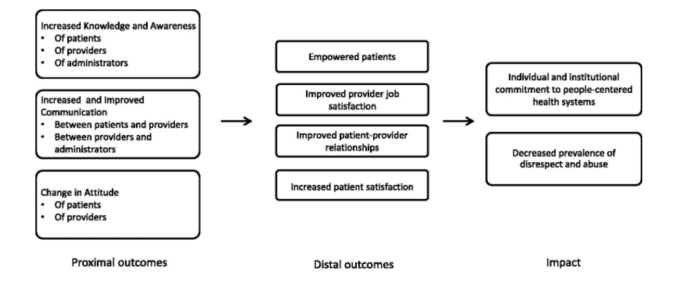Respectful Care
Country experiences
Several recent studies have documented encouraging improvements in RMC and reductions in mistreatment after implementation of a locally designed multi-faceted intervention. Publications about these studies are noted below, and links to some of the supporting study tools can be found in the implementation resources and tools section.
The effect of a multicomponent intervention on disrespect and abuse during childbirth in Kenya, BMC Pregnancy and Childbirth, 2015
The Heshima study investigated the effects of a multicomponent intervention on disrespect and abuse during childbirth in 13 facilities in Kenya. The multicomponent intervention encompassed facility and community-based interventions including facility-based training in promoting respectful care including values clarification and attitude transformation, support to quality improvement teams, caring for carers, monitoring of disrespect and abuse, mentorship, and open maternity days. Community level interventions included community workshops (e.g. respectful care sensitization meetings), mediation/alternative dispute resolution and counseling of community members. The intervention was associated with an overall reduction in disrespect and abuse from 20% to 13% as reported by postnatal women after discharge from maternity units, with most sub-categories of disrespect and abuse declining by 40–50 % (e.g. verbal abuse). Observations of patient-provider interactions also measured significant reductions in observed disrespect and abuse. Of note, observers reported D & A with more frequency than patients in interviews, a phenomenon that has been documented in other studies. Night shift deliveries were associated with greater verbal and physical abuse. The Heshima study findings suggest that locally designed multifaceted interventions across system levels have the potential to reduce the occurrence of disrespect and abuse.
Multicomponent Interventions included:
Facility Level
- Training in promoting respectful care including values clarification and attitude transformation (VCAT)
- Quality improvements teams (QITs)
- Caring for carers
- D&A Monitoring
- Mentorship
- Maternity open days
Community Level
- Community workshops
- Mediation/alternative dispute resolution
- Counseling community members
Mitigating disrespect and abuse during childbirth in Tanzania: an exploratory study of the effects of two facility-based interventions in a large public hospital, BMC Reproductive Health, 2016
This was an exploratory pre- and post-design study in a large referral hospital in Dar es Salaam Tanzania to assess the effect of several interventions on women’s and providers’ knowledge, perceptions and experience of maternal health care. Based on the findings of a baseline assessment, a package of interventions was designed and implemented to address key factors identified as driving disrespect and abuse in the study hospital including 1) Open Birth Days (OBD), a birth preparedness and antenatal care education program, and 2) a workshop for healthcare providers based on the Health Workers for Change curriculum. Pre-post tests administered around the Open Birth Day sessions found a notable increase in patient knowledge of many of their rights during labor and delivery. Community follow-up interviews four to six weeks after delivery with women who had attended OBD found that 77.8 % of respondents said that participation in OBD made them feel “much more prepared for delivery” and 88.9 % of respondents said that the OBD made them feel “more comfortable about their delivery at the study facility”. Patient satisfaction with services received and their perceptions of quality improved substantially from baseline to end line (e.g. 75.8 % of women reported being very satisfied with their delivery experience compared to only 12.9 % at baseline). Patients and providers reported improved communication, which direct observations confirmed. Provider job satisfaction increased substantially from baseline levels, as did women’s reports of satisfaction and perceptions of care quality. Based on learning from the study, the authors “strongly recommend using a participatory process to identify acceptable, sustainable and appropriate interventions for addressing disrespect and abuse.”

Community and health system intervention to reduce disrespect and abuse during childbirth in Tanga Region, Tanzania: A comparative before-and-after study, Plos Medicine, 2017
The Staha study applied a comparative before-and-after evaluation design in an intervention and comparison hospital in the Tanga region of Tanzania to test a participatory community-health system intervention to reduce disrespect and abuse in childbirth. The intervention was developed through an iterative participatory process with local community and health system stakeholders and consisted of a client service charter and a facility-based, quality-improvement process that aimed to redefine norms and practices for respectful maternity care. Women’s self-report of experiencing disrespect and abuse during labor and delivery reduced significantly (66% reduced odds) in the intervention compared to the comparison hospital after the intervention. The biggest reductions were for physical abuse and neglect. The results were observed nearly one year after the end of the project implementation period. The Staha study demonstrated a promising strategy in which frontline community- and facility-based actors identify and act on manifestations and causes of disrespect and abuse in their own local setting. The study authors conclude that “developing quality-improvement strategies that can tackle both clinical competence and compassion, supported through community accountability mechanisms, should be a global priority” (Kujawski SA, et al. 2017).
What did the researchers do and find?
A comparative before-and-after evaluation of an intervention to address disrespect and abuse during childbirth. This study used a participatory community and health system intervention in 2 hospitals in Tanga Region, Tanzania.
After nearly 1 year, the intervention was associated with a 66% reduced odds of a woman experiencing any disrespect or abuse during childbirth, with the biggest reductions observed for physical abuse and neglect.
What do these findings mean?
This study suggests that supporting frontline community- and facility-based actors to identify and act on the symptoms and causes of disrespect and abuse in their own settings may be associated with a reduction of disrespectful treatment.
The results should be interpreted as a proof-of-concept study, as the intervention was tested in only 2 facilities.

